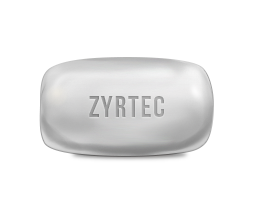

Zyrtec: Comprehensive Guide
Zyrtec is an antihistamine medication containing the active ingredient cetirizine. It is commonly used to relieve symptoms associated with allergic rhinitis (hay fever), urticaria (hives), and seasonal allergic rhinitis. Cetirizine works by blocking the action of histamine, a substance in the body that causes allergy symptoms.
DIRECTIONS
Take Zyrtec orally as directed by your healthcare provider, usually once daily with or without food. Follow the dosage instructions on the package or as prescribed by your doctor. Do not crush or chew the tablets. If using Zyrtec liquid, carefully measure the dose using a special measuring device/spoon.
PRECAUTIONS
Before taking Zyrtec, inform your doctor about any medical conditions you have, especially kidney problems or liver disease. Also, disclose any medications you are currently taking, including prescription drugs, over-the-counter medicines, and herbal supplements, as they may interact with Zyrtec.
CONTRAINDICATIONS
Do not take Zyrtec if you are allergic to cetirizine or any other ingredients in the medication. It is contraindicated in patients with severe kidney impairment or with a known sensitivity to hydroxyzine.
POSSIBLE SIDE EFFECTS
Common side effects of Zyrtec may include drowsiness, dry mouth, headache, dizziness, and fatigue. Contact your doctor if you experience any persistent or severe side effects.
DRUG INTERACTIONS
Zyrtec may interact with certain medications, including other antihistamines, sedatives, tranquilizers, and alcohol. These interactions can increase the risk of side effects or affect the effectiveness of Zyrtec. Inform your doctor about all the medications you are taking to avoid potential interactions.
MISSED DOSE
If you miss a dose of Zyrtec, take it as soon as you remember. However, if it is almost time for your next dose, skip the missed dose and resume your regular dosing schedule. Do not double the dose to catch up.
OVERDOSE
In case of overdose, seek immediate medical attention or contact a poison control center. Overdose symptoms may include extreme drowsiness, confusion, and hallucinations.
STORAGE
Store Zyrtec at room temperature away from moisture and heat. Keep the medication out of reach of children and pets. Do not store in the bathroom.
Description of its Role in the Treatment of Allergic Rhinitis, Urticaria, and Seasonal Allergic Rhinitis
Zyrtec plays a crucial role in the treatment of allergic rhinitis, urticaria, and seasonal allergic rhinitis by providing relief from common allergy symptoms. Allergic rhinitis, also known as hay fever, is characterized by symptoms such as sneezing, itching, nasal congestion, and runny nose, which are caused by the body’s immune response to allergens such as pollen, dust mites, or pet dander. Urticaria, or hives, manifests as raised, itchy welts on the skin and is often triggered by allergic reactions to food, medications, or insect stings. Seasonal allergic rhinitis occurs during specific times of the year when allergens such as pollen are prevalent in the environment. Zyrtec helps alleviate these symptoms by blocking the action of histamine, thereby reducing allergic reactions and improving quality of life for individuals affected by these conditions. It is important to use Zyrtec as directed by a healthcare professional and to continue other allergy management strategies as recommended, such as avoiding triggers and using nasal sprays or eye drops as needed.
